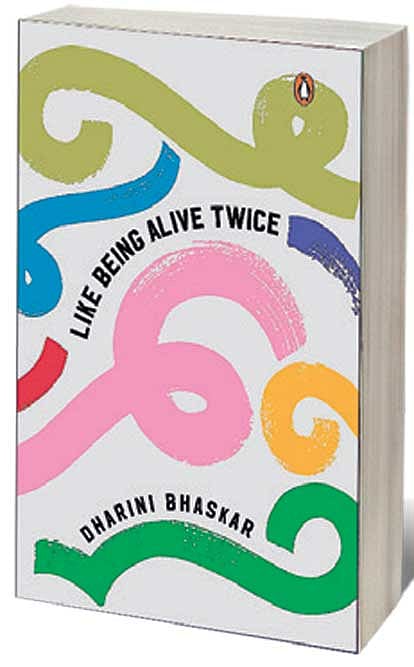What Ifs

DHARINI BHASKAR’S Like Being Alive Twice is an unusual novel, straddling genres and styles with rare aplomb. Set in a dystopian India, this is a love story with a difference: a story that was, and a story that might have been.
The narrator here is Priyamvada aka Poppy, who, in Chapter 1, looks back to seven years ago, when Poppy, her boyfriend Tariq ‘Tar’ and their friend and colleague Yana go to a mountain town for a break. Poppy and Yana know that Tar means to propose to Poppy. But what happens, instead, is quite different. Tar, apprehensive about his future, suggests he and Poppy go overseas. Poppy refuses. There is a quarrel, and she leaves, to begin a relationship with Yuvraj, Yuvi. Yuvi, who has it all:‘ …parentage that was uncontroversial; an educational degree that would not offend; a past that did not in any way betray him…’. Yana ends up with Tar.
But this is not where it stops; the next chapter is ‘Seven Years Ago: As it Could Have Been’. This is the same scenario, the same set-up. Tar and Poppy are in love. There is Yana, and there is Yuvi. There is even the disagreement over Tar’s future—but it does not tear them apart. Tar proposes, Poppy accepts. They are all set to be happy.
It is with this pattern that the story progresses. Year by year, counting down to the present, each year represented by two chapters: one that was, the other that could have been. Both scenarios are peopled by the same characters: Poppy, Tar, Yuvi, Yana. Tar’s and Poppy’s parents and other relatives, people they know, people they live amidst. The same restaurants, the same jobs, the same pieces of décor, the same books occur in both scenarios—and yet, they are different. Because in the India of this book, everybody has Tally cards, and their Tally score is calculated based on several criteria: which community they belong to, what views they voice, whether they abide by the norms a strict (very patriarchal) social structure prescribes. That score governs where they may live: in posh, carefully guarded enclaves like Palash Bagh; in squalid bastis, or, in the most desperate of circumstances, in Door Mohallah, a dark, dingy locality with little water and no hope.
Imran Khan: Pakistan’s Prisoner
27 Feb 2026 - Vol 04 | Issue 60
The descent and despair of Imran Khan
This is a dystopian India, but what makes it so disturbing is that it could be an India we will live to see. The sharp demarcations between who is esteemed and who is ostracised, between ‘laudable’ actions and those which are (if not outright criminal) at least liable to have you punished: these could very well be part of our future if there isn’t a revolution. And yet, like Poppy, blissfully unaware, refusing to acknowledge the truth even when confronted with it, most of us are oblivious. The privilege we are so used to makes us immune. Not realising, perhaps until it’s too late, that we are all affected. As Tar’s mother says at one point: “But tell me, Poppy, when did stories stop growing? When did they cease spilling into one another? When did we presume—how dare we presume that the subjugation of one group does not impinge on the well-being of every other?”
Interwoven with poetry (by American poet Linda Gregg), Like Being Twice Alive has moments of poignancy, of romance, warmth and comfort. As it progresses, though, the veneer is stripped away, the horrifying truth comes ever closer to its protagonists.
Dharini Bhaskar’s writing is sharp and impactful, her characters very real, very human. Poppy, warts and all, makes for a protagonist one can sympathise with, and Tar’s fears should be the fears of all of us: “…Nobody cares. Nobody is even listening. All that is asked of us— it’s simple—is that we repeat what the others are saying.”
Hard-hitting, timely, and unsettling, this is a book for our times: a reminder of what could happen.

